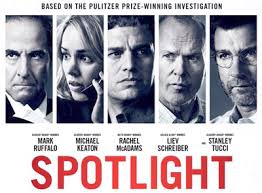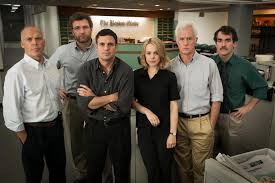I saw Spotlight last night. I found the movie sobering, understated, and well-crafted. I did not become deeply involved until March 2002, but as far as I know the film presents matters accurately, especially in its portrayal of the emotional roller coaster that everyone went through.
The reviews have been 99% positive. Here is the summary from Roger Ebert:
Tom McCarthy’s superb “Spotlight,” co-written by McCarthy and Josh Singer, is the story of that investigation. “Spotlight” is a great newspaper movie of the old-school model, calling up not only obvious comparisons with “All the President’s Men” and “Zodiac,” two movies with similar devotion to the sometimes crushingly boring gumshoe part of reportage, but also Cary Grant and Rosalind Russell shouting into adjacent phones in “His Girl Friday.” At a late moment in “Spotlight,” there’s an image of the presses printing off the edition that carries the church abuse story. Such a scene is so de rigueur in newspaper movies that it borders on cliche, but in “Spotlight” it is a moment of intense emotion. The truth in that edition, the evil it describes, will be a wound in the psyche of millions, but it must come out.
The Spotlight team is editor Walter “Robby” Robinson (Michael Keaton), and three reporters, Michael Rezendes (Mark Ruffalo), Sacha Pfeiffer (Rachel McAdams), and Matty Carroll (Brian d’Arcy James). John Slattery plays Globe managing deputy editor Ben Bradlee Jr.. All of the reporters are locals, and everyone has some connection to the Catholic Church (referred to as only “The Church”). When a new editor, Marty Baron (Liev Schreiber), comes on board, he is perceived as an outsider because he’s not from Boston at all (he is first seen boning up on the city by devouring “The Curse of the Bambino.”) In an initial meeting with Robby, Baron brings up a recent piece by a Globe columnist about the Boston archdiocese’s potentially shady handling of various abuse cases. Baron suggests the story could be perfect for the Spotlight team. Robby hesitates, but Baron gently pushes: “This strikes me as an essential story for a local paper.” It’s a great line, and it’s so underplayed by Schreiber that you might miss its effectiveness. This goes for his entire performance. Right before the church-abuse edition goes to print, they all meet in Marty’s office, and he looks through a hard copy of the story, crossing out words, murmuring to himself, “Adjectives.” That is a newspaper man.
Holed up in a cluttered basement office, the Spotlight team exhibit the behavior of people who spend more time with one another than they do with their own families. Personal details about their lives are at a minimum. Sacha goes to church every Sunday with her grandmother, a ritual she finds increasingly painful. Rezendes’ marriage is on the rocks. Matty has a couple of kids, and a big magnet on his refrigerator emblazoned with an American flag and “Remember 9/11” on it. We know who these people are.
At first the team focuses on one former priest, John J. Geoghan, alleged to have molested many children years ago. But Baron urges them to remember that the story is bigger than just one “bad apple” priest. He wants to go after the whole system. The corruption is obviously systemic, but the key issue becomes: did Cardinal Law know? That’s the big game Spotlight is after. “The Curse of the Bambino” may have taught Baron about Red Sox Nation, but a meet-and-greet with Cardinal Law (a creepily sincere Len Cariou) during Baron’s first week on the job is even more illuminating. Baron is stunned at Law’s assumption that the Boston Globe would work with the Catholic Church.
Sacha and Michael question the adult victims willing to come forward, who are so traumatized they can’t find the words to describe what was taken from them. A couple of lawyers (played by Billy Crudup and Stanley Tucci) sit on opposite ends of the spectrum of dealing with the Catholic Church from a legal standpoint.
McCarthy and his entire team, from production designers to location scouts to extras casting directors, get Boston right. Different neighborhoods (Back Bay, Southie) are used as shorthand for entire worlds. There are clear class divides (predator priests often worked in low-income neighborhoods, targeting boys who needed father figures). The atmosphere is very “Boston”: having a beer on the back porch in the dead of winter or arguing about work over hot dogs at Fenway. Boston, with its confusing colonial-era streets and church spires jutting into the sky on practically every corner, is the soul of the movie. “Spotlight” feels local.
“Spotlight” also shows a deeper truth, the level of psychological trauma brought on by abuse, not just to the victims, but to horrified Catholics everywhere. “Spotlight” takes faith seriously. An ex-priest turned psychiatrist is an important source, and when he’s asked how Catholics reconcile the abuse scandal with their faith, he replies, “My faith is in the eternal. I try to separate the two.” Mark Ruffalo modulates his performance over the course of the film at a world-class level, moving from a patient dogged investigator to a rumpled maniac racing through courthouses, chasing down cabs and screaming at his boss. In a raw moment, he confesses to Sacha that even though he stopped going to church years ago, he always assumed that one day he would go back. “I had that in my back pocket,” he says, glancing at her with a flash of anguish. “Spotlight” makes the issue of lost faith visceral by taking the time to let it breathe, letting it play its part in the story.
The newspaper world has changed a lot since 2002. Things look pretty grim. But good long-form journalism still exists (the recent New York Times series about the conditions for nail salon workers is a good example). Such work is as important now as it has ever been. “Spotlight” is the kind of movie where a scene showing a group of reporters huddled over church directories, taking notes in silence, becomes a gripping sequence. (It’s reminiscent of the row of mission control guys in “Apollo 13,” whipping out their slide rules as one, thereby almost single-handedly expanding the concept of heroism.) “Spotlight,” with all its pain and urgency, is a pure celebration of journalists doing what they do best.
Here is my reaction to the film:
All the institutions in Boston failed: the church hierarchy, the laity, the police, even the Globe, which tossed Saviano’s evidence the first time he sent it, even one of the reporters on the Spotlight team, who had not followed up a warning about 20 abusive priests in the archdiocese.
Outside of the time frame of the film, we know that cardinals and popes failed. John Paul II ignored specific and reliable reports of child abuse, and protected the incestuous molester drug addict Maciel. Everyone turned away their faces from the victims.
The film also show the range of emotions that those who were investigating the abuse experienced, and I went through them to. Disgust: reading the El Paso case was like dipping your hand into a septic tank. Disbelief: did a bishop really go into the Mexican desert to hold black masses with his abusive priests? Doubts: victims were suspicious of everyone, including me, and were often emotional wrecks. Obsessiveness: I was working seven days a week, 80-90 hours a week, and would get up at 3 AM to work several hours. Anger. Bitterness. The ruined lives of the victims. The sadness of the lost faith of the reporters.
Here are some thoughts on three matters:
The abusers
Some (many?) were clever psychopaths, who could manipulate victims, their families, the police, the bishops. But others were losers. All of them were interested in both control and sex, treating their victims like marionettes, like toys. Many were immature homosexuals, mamma’s boys, who went into the priesthood because it was free from masculine demands. They were the same emotional age as their victims, and they had many victims because they liked 14 year olds, and boys kept aging out. They all knew they could abuse with few consequences. Perhaps they would be transferred, or sent for a vacation to a treatment center, but nothing worse would happen to them. They were protected. Perhaps 7-10% of priests in the United States had a sexual relationship with a minor, mostly adolescents, mostly males.
Complicity and Enabling
Sipe blames celibacy. He thinks many, perhaps 50%, of priests are having sex, mostly with adults, and this creates an atmosphere of shared sexual secrets which makes everyone reluctant to blow the whistle on abuse. Perhaps. A bigger element was clericalism, which placed the clergy on a pedestal, or at least made them immune from lay supervision. This has a legal ancestor on the privilege of clergy which exempted clerics from harsh medieval justice. In response to Protestantism, the Catholic Church exalted the priesthood far above the laity. In the United States, priests were among the few educated members of an immigrant church.
In Boston, as Spotlight emphasizes, the Catholic Church was like a club. It did good, and also gave people the opportunity to network for many purposes, including business. It was to everyone’s advantage (except the victims’) to pretend that everything was basically OK. If you broke silence, you were eased of the club, lost business, lost contacts, were isolated.
While there are uniquely Catholic, and even Bostonian, tendencies that contributed to the abuse and its toleration, the ultimate reasons go deeper. The Anglicans have had similar problems. Marie Fortune, a religious sociologist, started a journal to deal with abuse – physical, sexual, and emotional – and religion (and it occurs in all religions). The journal failed; no one was interested. People turn away their faces; they don’t want to know. How many times have you heard “I don’t want to get involved.”
The Explosion
I am no prophet, but I detect the hand of Providence in all this to purify a church which had grown corrupt. It was a unique moment: the internet had begun to make information available, but had not yet destroyed newspapers. Newspapers still had the resources to conduct such a massive investigation. The editor of the Globe was an outsider, who was willing to upset the apple cart. Judge Sweeney ruled to release the personnel files of abusive priests. The American justice system is one of the most open in the world and unlike European courts does not place the protection of the privacy of criminals higher than the public’s right to know. The 9/11 attack had awakened the American public to the fragility of existence and the working of dark forces.
The Globe’s work set off first a national and then an international investigation and reform which is still going on. Some progress has been made, but even in the United States some bishops still play games to protect abusers. Outside of the United States bishops are largely clueless. In Germany convicted abuser priests work in parishes. The third world thinks it has bigger problems than abusive priests.
The world will never be perfect, but thanks to the work of reporters, it has changed in one respect for the better. Some children will not be abused, they will not grow up with ruined lives and commit suicide slowly or quickly.
Thank you, reporters of the Boston Globe and throughout the world.


Thank you for posting this. I will link it on my blog with comments.